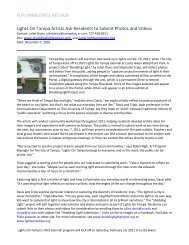Roland Barthes â Mythologies - soundenvironments
Roland Barthes â Mythologies - soundenvironments
Roland Barthes â Mythologies - soundenvironments
You also want an ePaper? Increase the reach of your titles
YUMPU automatically turns print PDFs into web optimized ePapers that Google loves.
The Nautilus and the Drunken BoatThe work of Jules Verne (whose centenary was recentlycelebrated) would be a good subject for a structural study: it ishighly thematic. Verne has built a kind of self-sufficientcosmogony, which has its own categories, its own time, space,fulfilment and even existential principle.This principle, it seems to me, is the ceaseless action of secludingoneself. Imagination about travel corresponds in Verne to anexploration of closure, and the compatibility between Verne andchildhood does not stem from a banal mystique of adventure, buton the contrary from a common delight in the finite, which onealso finds in children's passion for huts and tents: to encloseoneself and to settle, such is the existential dream of childhood andof Verne. The archetype of this dream is this almost perfect novel:L'Ile mystérieuse, in which the manchild re-invents the world, fillsit, closes it, shuts himself up in it, and crowns this encyclopaediceffort with the bourgeois posture of appropriation: slippers, pipeand fireside, while outside the storm, that is, the infinite, rages invain.Verne had an obsession for plenitude: he never stopped putting alast touch to the world and furnishing it, making it full with an egglikefullness. His tendency is exactly that of an eighteenthcenturyencyclopaedist or of a Dutch painter: the world is finite, the worldis full of numerable and contiguous objects. The artist can have noother task than to make catalogues, inventories, and to watch outfor small unfilled corners in order to conjure up there, in closeranks, the creations and the instruments of man. Verne belongs tothe progressive lineage of the bourgeoisie: his work proclaims thatnothing can escape man, that the world, even its most distant part,is like an object in his hand, and that, all told, property is but adialectical moment in the general enslavement of Nature. Verne inno way sought to enlarge the world by romantic ways of escape or65mystical plans to reach the infinite: he constantly sought to shrinkit, to populate it, to reduce it to a known and enclosed space, whereman could subsequently live in comfort: the world can draweverything from itself; it needs, in order to exist, no one else butman.Beyond the innumerable resources of science, Verne invented anexcellent novelistic device in order to make more vivid thisappropriation of the world: to pledge space by means of time,constantly to unite these two categories, to stake them on a singlethrow of the dice or a single impulse, which always come off. Evenvicissitudes have the function of conferring on the world a sort ofelastic state, making its limits more distant, then closer, blithelyplaying with cosmic distances, and mischievously testing thepower of man over space and schedules. And on this planet whichis triumphantly eaten by the Vernian hero, like a sort of bourgeoisAntaeus whose nights are innocent and 'restoring', there oftenloiters some desperado, a prey to remorse and spleen, a relic froman extinct Romantic age, who strikingly shows up by contrast thehealth of the true owners of the world, who have no other concernbut to adapt as perfectly as possible to situations whosecomplexity, in no way metaphysical nor even ethical, quite simplysprings from some provocative whim of geography.The basic activity in Jules Verne, then, is unquestionably that ofappropriation. The image of the ship, so important in hismythology, in no way contradicts this. Quite the contrary: the shipmay well be a symbol for departure; it is, at a deeper level, theemblem of closure. An inclination for ships always means the joyof perfectly enclosing oneself, of having at hand the greatestpossible number of objects, and having at one's disposal anabsolutely finite space. To like ships is first and foremost to like ahouse, a superlative one since it is unremittingly closed, and not atall vague sailings into the unknown: a ship is a habitat before beinga means of transport. And sure enough, all the ships in Jules Verneare perfect cubby-holes, and the vastness of their circumnavigationfurther increases the bliss of their closure, the perfection of theirinner humanity. The Nautilus, in this regard, is the most desirable66




